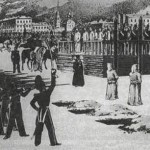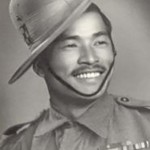Weekly Wrap Volume 76
On a field about fifty miles from Boston, Strawberry Hill, on the evening of September 3, 1880, history was made. It is unlikely the department store employees who were tossing around a ball knew that this game would still be talked about 135 years later. As the crowd took their seats, the ball players took their positions; the Sun dipped below the horizon and the Moon rose. And then, the lights came on to illuminate the field. It was said the lights were as bright as “90,000 candles” burning simultaneously. This was the first baseball game played… (more)
 Pre-Sliced Bread Was Once Banned in the United States
Pre-Sliced Bread Was Once Banned in the United States
In 1943, Claude R. Wickard, the head of the War Foods Administration as well as the Secretary of Agriculture, got the bright idea to ban pre-sliced bread in America, which he did on January 18, 1943. The specific reasons behind this aren’t entirely clear, though it was about conservation of resources, particularly generally thought to have been about conserving wax paper, wheat, and steel. With regards to the wax paper conservation, by FDA regulations… (more)
 The Mock Execution of Fyodor Dostoevsky
The Mock Execution of Fyodor Dostoevsky
On December 22, 1849, members of a Russian intellectual literary group known as the Petrashevsky Circle were sent to Semyonov Square to meet their fate – death by firing squad. With the men pointing their rifles and fingers resting on the trigger, a messenger from the Tsar rode into the square waving a white flag. Like something out of a Hollywood movie, he declared he had an official pardon from the Tsar of Russia, Nicholas I, in a “show of mercy.” This was not a show of mercy, but rather a staged way of fostering fear, terror, and gratitude. This was a… (more)
The two distinct spellings for what today is essentially the same condiment are simply the reflection of the evolution of nearly everyone’s favorite French fry topper. (Well, in certain regions of the world.) Today often disdained as low-brow, when it was first conceived, ketchup was revered for the flavor it added to foods. Initially a paste made from fermented fish guts… (more)
 Who Was Sadie Hawkins and Why Does She Have a Dance Named After Her?
Who Was Sadie Hawkins and Why Does She Have a Dance Named After Her?
Sadie Hawkins’ renown, which evolved into an American folk-holiday in some places, doesn’t really originate from a dance, but rather from a race, as we shall soon see. Sadie was the product of the fertile imagination of cartoonist Al Capp. She was a character in his popular cartoon Lil’ Abner, set in the hillbilly town of Dogpatch, that began its wildly successful 40 year run in 1934. The way Al tells it, Sadie was the daughter… (more)
Bonus Quick Facts:
- Pop Rocks were invented by Chemist William A. Mitchell while working for General Foods. He also invented Tang, Cool Whip, quick-setting Jell-O, a tapioca substitute, and powdered egg whites, among other things. All total, he received over 70 patents in his lifetime.
- The name “tetris” derives from the Greek prefix “tetra-” (because the game pieces are all tetrominoes) and the latter “-is” is from “tennis”, which is the primary creator of Tetris’, Alexey Leonidovich Pajitnov, favorite sport. Tetrominoes are four element polyominoes. Polyominoes are known to have been used in puzzle games for at least 90 years (and most likely much further back than that) at the time Pajitnov developed Tetris at the Dorodnicyn Computing Center, which was a part of a Soviet government funded research center in Moscow, called the Soviet Academy of Sciences. Because he was working at this government facility at the time, for many years after its creation, the Soviet Union owned the rights to Tetris.
- In the cartoon “Pinky and the Brain”, Brain’s name is an acronym for “Biological Recombinant Algorithmic Intelligence Nexus”. Pinky’s name is probably a reference to the fact that a “pinky” is another name for a baby mouse that has not yet grown fur. However, in the cartoon itself, the name was given to Pinky when Brain was referring to his own pinky when insulting certain scientists, but Pinky mistakenly thought Brain was referring to him. Besides “pinky”, other valid names for baby mice are pup and kitten.
- In 1896, there was a group called the “Society for the Prevention of People Being Buried Alive”. Among other things, they attempted to get a law established making it so you could only bury someone after strong smell and putrefaction were evident.
- “Nephew” at one time was a gender neutral term, but since the 17th century has referred nearly exclusively to male children of one’s siblings or brother/sister-in-law’s children. The word “nephew” comes from the Old French “neveu” meaning “grandson, descendant”, which in turn comes from the Latin “nepotem”, meaning “sister’s son, grandson, or descendant”. The first documented case of “nephew” being used in English was in the 14th century. Today, because we now lack a gender neutral word to refer to a niece or nephew, it has been suggested that the slang word “nibling” be adopted, derived more or less from “sibling”.
- Eric Clapton’s son, Conor, who he had with model and actress Lori del Santo while still married to Patti Boyd, died at the age of four years old after falling from a window in del Santo’s 53rd floor, New York City apartment. The window was a full wall window that had been removed by a janitor to let fresh air in while he worked. Conor was playing hide and seek with a nanny and running from her when he ran into the room with the open window and straight out of it. Clapton found out when he arrived later to pick up Conor and del Santo to go to the zoo. This gave rise to one of Clapton’s most popular songs, “Tears in Heaven”, which is referencing Clapton’s grief as well as regret that up until that point he had been a reluctant father who was often absent and, according to del Santo, only the night before had told her that he wanted to become a much bigger part of Conor’s life, only to have Conor die the next day; hence the “Would you know my name, if I saw you in heaven?” According to del Santo, during her pregnancy, Clapton attempted to commit suicide by hanging himself, but ultimately just passed out and eventually regained consciousness. Clapton’s manager also attempted to get del Santo to abort the baby as he thought del Santo would try to use the baby to extort money from Clapton, which ultimately never happened.
- In Lord of the Rings: the Fellowship of the Ring when Arwen defeats the Ringwraiths after crossing the river, the words she speaks in that scene translate into English: “Waters of the Misty Mountains, hear the word of power, rush, waters of Bruinen (Loudwater), against the Ringwraiths!” (Nîn o Chithaeglir lasto beth daer; rimmo nín Bruinen dan in Ulaer!)
- In 1830, a French tailor by the name of Barthelemy Thimonnier patented a sewing machine that used the chain stitch; the first such machine to replicate sewing by hand. By 1841, he had a factory with over 80 machines and a contract with the French army for uniforms. However, the factory was destroyed by a riotous group of French tailors who were afraid the sewing machine would spell the end of their trade. Thimonnier never recovered and died penniless.
Other Interesting Stuff:
 How Leonard Nimoy Came Up With “Live Long and Prosper” and the Associated Hand Gesture
How Leonard Nimoy Came Up With “Live Long and Prosper” and the Associated Hand Gesture
The hand gesture itself is a slight modification of the Hebrew gesture forming the letter “Shin”, which represents the name “Shaddai” meaning “Almighty” (God). This gesture is still used today by orthodox Jews of the Kohanim, which are priests descended from Ahron by the patrilineal line. These Kohanim form a subset of the descendants of the priestly Levite tribe. The Kohanim use the Shin gesture during a blessing ceremony, the nesiat kapayim or the “Priestly Blessing”, that accompanies… (more)
 Why Testosterone Affects Body Hair Growth
Why Testosterone Affects Body Hair Growth
Testosterone is a steroid hormone from a group called androgen. Androgen affects many characteristics in our bodies, like the development of the male sex organs, the deepening of the voice during puberty, muscle and bone strength, and hair growth. Interestingly, the same circulating androgen, like testosterone, can increase hair growth in one area of our bodies and inhibit it in others. Thought to be gene… (more)
Exactly who introduced these golden strips of goodness to the world isn’t entirely known. Among the various theories, it’s generally accepted that the French fry was invented by either the Belgians or the French. Potatoes were first introduced to Europe not through the French or Belgians, but through the Spanish. In 1537, Jimenez de Quesada and his Spanish forces encountered a village in Colombia where all the natives had fled. Among other things… (more)
 Most Thermostat Controls in Large Office Buildings Don’t Do Anything
Most Thermostat Controls in Large Office Buildings Don’t Do Anything
These placebo controls for large HVAC systems do nothing but make you think you are adjusting the temperature. In some cases, the system even includes white noise generators to make you think that the temperature controls are working, when in fact the heating and cooling systems are controlled elsewhere. According to HVAC specialist Richard Dawson, about 90% of non-secured office thermostats are placebo controls. These dummy thermostat controls have been used as far back as the 1960s as a response to rising heating costs, which… (more)
Providing shoppers with a chance to buy and transport goods across international boundaries without paying local and national taxes, duty-free shops are found in airports and other ports and stations around the world. A creation of the 20th century, duty-free shops mark a sharp departure from more than 2,000 years of nations generating revenue by taxing the trade in commodities and other goods. The practice of imposing such taxes traces its origins to at least the ancient Greeks and Romans where duties were levied on a wide variety of imports and exports. As leaders through the ages… (more)
 Havildar Bhanbhagta Gurung’s Knife Wielding WWII Assault
Havildar Bhanbhagta Gurung’s Knife Wielding WWII Assault
In March of 2008, the world lost one of the most fearless soldiers to have served during WWII; a man who single-handedly cleared five heavily fortified positions with nothing more than a knife, a few grenades, a rock, and a complete disregard for the bullets flying around him the whole time. This is the story of Bhanbhagta Gurung. First thing first, we should address the fact that there doesn’t seem to be a clear consensus on how exactly Havildar Bhanbhagta Gurung’s first name is supposed… (more)
This Week’s Podcast Episodes:
- Podcast Episode #346: Temporarily Insane
- Podcast Episode #347: The Big Cheese in the Sky
- Podcast Episode #348: The First African American to Play in the Major Leagues
- Podcast Episode #349: The First Blonde Bombshell
- Podcast Episode #350: The Queen of Baseball
Quote of the Week:
- “The best way to make your dreams come true is to wake up.” -(Author unknown, generally attributed to French poet Paul Valery)
| Share the Knowledge! |
|








